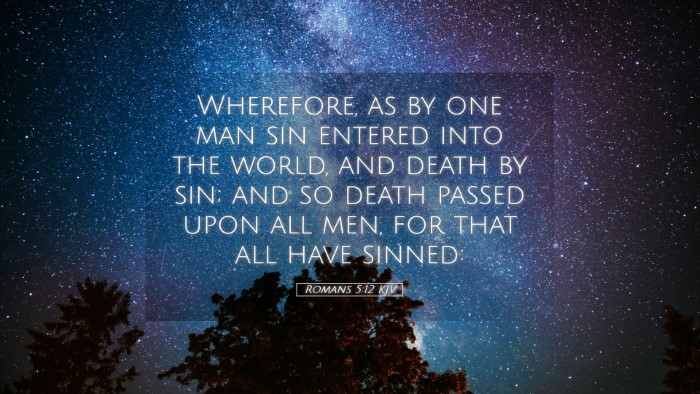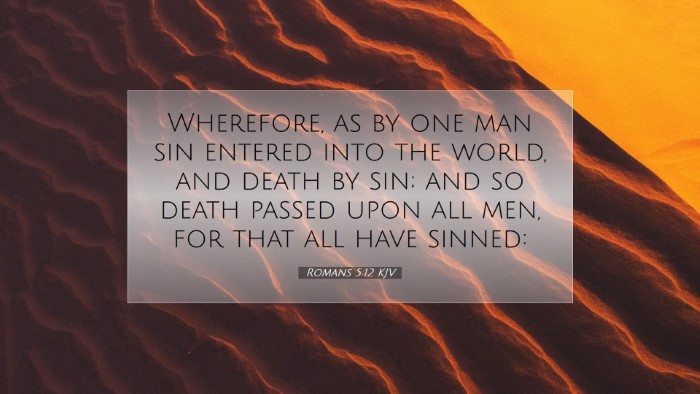Old Testament
Genesis Exodus Leviticus Numbers Deuteronomy Joshua Judges Ruth 1 Samuel 2 Samuel 1 Kings 2 Kings 1 Chronicles 2 Chronicles Ezra Nehemiah Esther Job Psalms Proverbs Ecclesiastes Song of Solomon Isaiah Jeremiah Lamentations Ezekiel Daniel Hosea Joel Amos Obadiah Jonah Micah Nahum Habakkuk Zephaniah Haggai Zechariah MalachiRomans 5:12
Romans 5:12 KJV
Wherefore, as by one man sin entered into the world, and death by sin; and so death passed upon all men, for that all have sinned:
Romans 5:12 Bible Commentary
Commentary on Romans 5:12
Verse: "Therefore, just as sin came into the world through one man, and death through sin, and so death spread to all men because all sinned."
Introduction
The verse Romans 5:12 serves as a profound theological statement regarding the origin of sin and death in the world. It represents a pivotal moment in Paul’s exposition of Christian soteriology, illustrating the profound impact of Adam's transgression on humanity. This commentary synthesizes insights from revered public domain scholars including Matthew Henry, Albert Barnes, and Adam Clarke to explore the ramifications of this passage.
Exposition of the Text
Romans 5:12 can be broken down into several critical components that reveal the depth of sin’s entry into the human experience.
-
Sin Came Through One Man
According to Matthew Henry, the "one man" refers specifically to Adam, the first human according to Scripture. His transgression is not merely a historical event but serves as a representation of all humanity. The act of disobedience in the Garden of Eden is our entry point into a state of sin, a theme echoed through the ages in theological discussions.
-
The Nature of Death
Albert Barnes articulates that the death mentioned here is not solely physical but encompasses both spiritual death and eventual physical death. Spiritual death, or separation from God, commenced with Adam's sin, paving the way for a world characterized by mortality and moral decay.
-
Universal Spread of Death
Henry points out that death "spread to all men," highlighting the ubiquitous nature of sin's consequences. This verse emphasizes that sin is not an isolated occurrence; it is a condition that infects every human being. Adam’s sin, therefore, established a reality that affects all of humanity, moving through generations.
-
All Sinned
In this line, Paul lays the groundwork for understanding original sin and its ramifications. Adam Clarke discusses how the phrase "because all sinned" signifies that, in Adam, all human beings participated in his sin. This doctrinal perspective is crucial for comprehending justification and redemption offered through Christ.
Theological Implications
The themes presented in Romans 5:12 offer profound implications for theology, especially regarding the nature of sin, salvation, and grace.
-
Original Sin
Henry's insights suggest that the concept of original sin is foundational for understanding the human condition. This theological viewpoint asserts that humanity inherits a sinful nature, which leads to actual sins throughout life. It posits that without God’s intervention, every individual is inclined toward sin.
-
The Need for Redemption
Barnes emphasizes the necessity of redemption through Christ, establishing a foundation for the New Testament’s portrayal of Jesus as the second Adam. The first Adam's failure stands in stark contrast to the redemptive work of Christ, who offers salvation and restores the broken relationship with God.
-
Grace Explored
Clarke notes that this passage sets the stage for exploring the grace that comes through Jesus Christ, contrasting the despair of sin and death with the hope and life brought forth through His sacrifice. Therefore, Romans 5:12 is not merely about judgement but simultaneously points to the grace available in Christ.
Practical Applications
Understanding Romans 5:12 is instrumental for pastors, students, and scholars in their ministries and studies. Here are some practical applications:
-
Preaching on Sin and Redemption
This verse provides a robust framework for preaching the Gospel, highlighting both the severity of sin and the supremacy of grace. Pastors can draw from this powerful contrast to convey the weight of human sinfulness and the necessity of Christ’s atoning sacrifice.
-
Catechetical Instruction
Theological education should include teaching on original sin and its consequences. Students and laypersons alike benefit from a clear understanding of these doctrines, which form the bedrock of Christian belief regarding salvation and humanity's need for redemption.
-
Pastoral Care
Engaging with individuals struggling with feelings of hopelessness can be strengthened by the insights from this verse. Connecting the universality of sin with the availability of grace offers a message of true hope and encouragement for transformation.
Conclusion
Romans 5:12 encapsulates the essential doctrinal perspectives regarding sin and death’s entry into the world. Insights gleaned from the writings of Henry, Barnes, and Clarke reinforce the gravity of the human condition while simultaneously illuminating the hope found in Jesus Christ's redemptive work. This verse serves as a key theological pivot point that invites deep reflection and understanding for all engaged in the study of Scripture.


